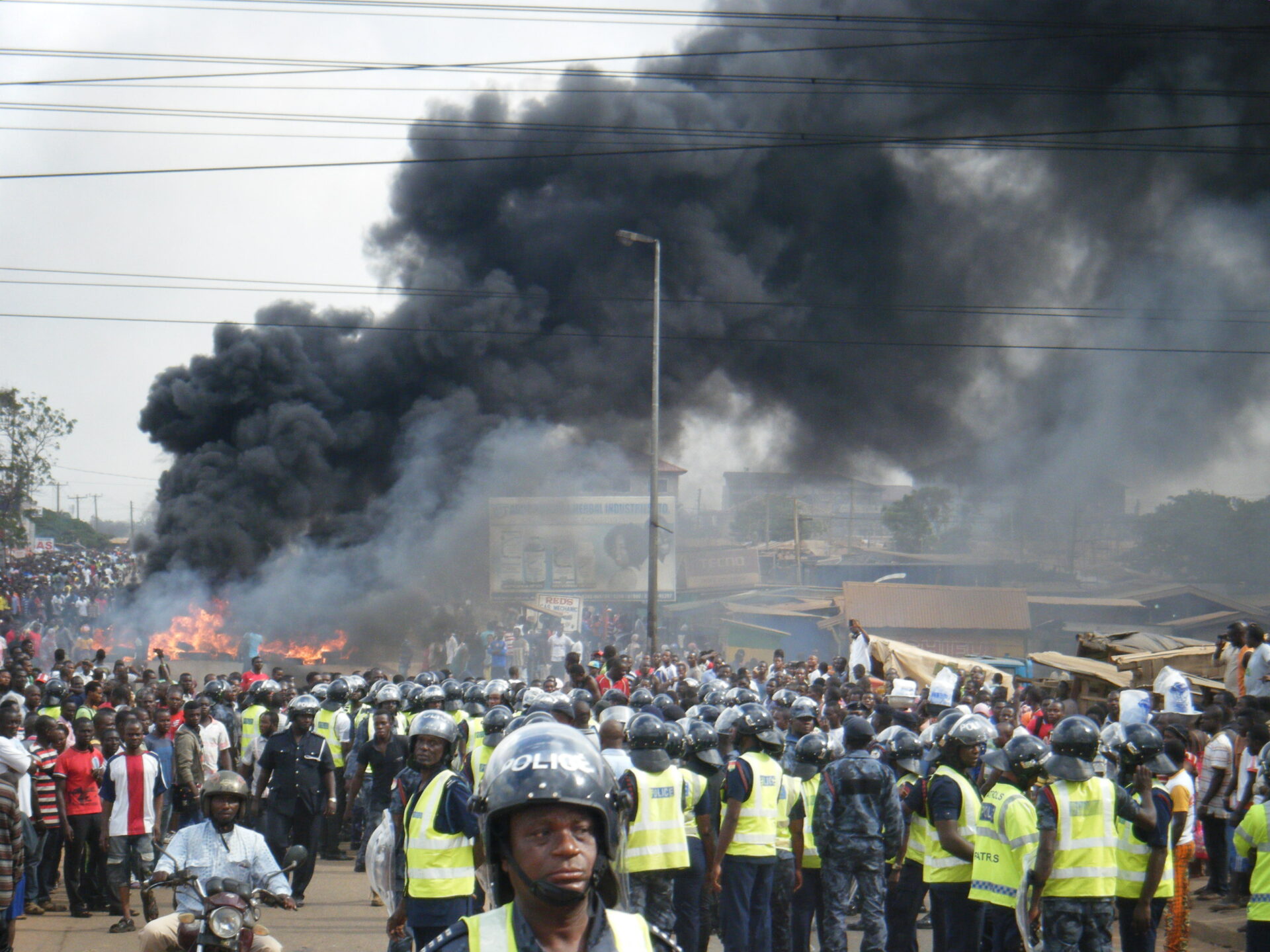Ghanaian demonstrators clashed with security forces in Accra on Monday, burning tires and throwing stones to protest the demolition of hundreds of houses to make way for better flood control, witnesses said.
Police fired tear gas and briefly arrested five people in a bid to deter the protesters, hundreds of whom also marched from the impoverished Old Fadama neighbourhood to parliament before turning back when met by soldiers, witnesses and police said.

Civil unrest is rare in Ghana, a country that prides itself on its ability to resolve political and social tensions peacefully, in contrast to some of its West African neighbours.
Demonstrators said they were angered by a decision by Accra Municipal Authority, backed by the government, to bulldoze the houses at the weekend in an area that borders on the Korle lagoon, making thousands homeless.
On Monday, residents picked through the remains of their shattered homes and businesses for their possessions.
“They (authorities) said they would demolish along the banks of the lagoon but they went beyond that limit and people are suffering as a result of what they did,” said Chief Yahaya Mahama, a traditional leader for many residents of Old Fadama.
Authorities say the lagoon channel must be deepened and widened if Accra is to avoid a repeat of flooding caused as rainfall blocked drains on June 3-4 and killed more than 50 people.
In a related incident that night, 96 people sheltering from the floods at a downtown gas station were burned alive when it exploded, making it the worst disaster to hit Ghana in decades.
Both incidents exposed the country’s ageing infrastructure, making flood control an urgent priority for the government of President John Mahama ahead of elections in December 2016.
Mahama has also vowed to end crippling power blackouts this year. The government is receiving aid from the International Monetary Fund to restore fiscal stability and kickstart rapid growth in an economy powered by exports of gold, oil and cocoa.
Residents said they opposed the destruction of houses and a decision to switch off electricity and water, and thus sanitation, to the neighbourhood.

“I have nowhere to go other than to sleep right here,” said Zainab Mohammad, pointing to a chair where she said she had spent the previous night. Mohammad, who works as a market porter, said she was eight months pregnant. (Additional reporting by Kwasi Kpodo; Editing by Tom Heneghan)
FRENCH VERSION
La police a tiré des gaz lacrymogènes et brièvement arrêté cinqpersonnes pour tenter de dissuader les manifestants, des centaines d’entre eux aussi ont défilé depuis le quartier déshéritéde Fadama vieux au Parlement avant de tourner à l’époque où se sont réunis par des soldats, témoins et la police a déclaré.
Les troubles civils sont rares au Ghana, un pays qui s’enorgueillitde sa capacité à résoudre les tensions politiques et socialespacifiquement, contrairement à certains de ses voisins d’Afriquede l’Ouest.
Manifestants a déclaré qu’ils étaient irrités par une décision deAccra administration municipale, soutenues par legouvernement, au bulldozer les maisons le week-end dernierdans une région qui borde la lagune Korle, faisant des milliers desans-abri.
Lundi, les résidents pris à travers les vestiges de leurs maisonsbrisées et les entreprises pour leurs possessions.
“Ils (les autorités) dit qu’ils seraient démolir le long des berges dela lagune, mais ils sont allés au-delà de cette limite et personnessouffrent de ce qu’ils firent,” a dit le chef Yahaya Mahama, unchef traditionnel pour de nombreux résidents de Fadama vieux.
Les autorités déclarent le canal lagon doit être approfondi etélargi si Accra veut éviter une répétition des inondations causéescomme pluie bloqué drains sur 3-4 juin et a tué plus de 50personnes.
Dans un incident relié cette nuit-là, 96 personnes mise à l’abrides inondations dans une station-service du Centre ont étébrûlées vives quand il a explosé, ce qui en fait la pire catastropheà frapper au Ghana au cours des décennies.
Ces deux incidents exposés l’infrastructure vieillissante du pays,rendant les inondation à contrôler une priorité urgente pour legouvernement du Président John Mahama avant les élections dedécembre 2016.
Manel a également promis à la fin des pannes d’alimentationparalysant cette année. Le gouvernement est également pénalisépar le Fonds monétaire International pour restaurer la stabilitéfinancière et croissance rapide kickstart dans une économiealimentée par les exportations d’or, de pétrole et de cacao.
Résidents dit ils s’oppose à la destruction de maisons et d’unedécision de passer hors électricité et eau et doncd’assainissement, dans le quartier.
« Je n’ai nulle part où aller autrement que de dormir ici, » a déclaré Zainab Mohammad, pointant vers une chaise où elle ditqu’elle avait passé la nuit précédente. Mohammad, qui travaillecomme un porteur de marché, a déclaré qu’elle était enceinte dehuit mois. (Autres rapports par Kwasi Kpodo ; Montage par TomHeneghan)


